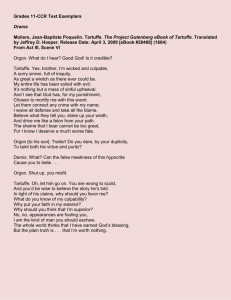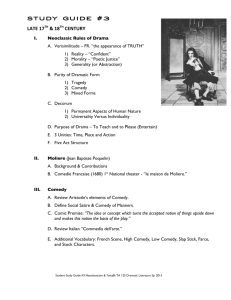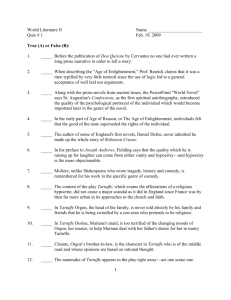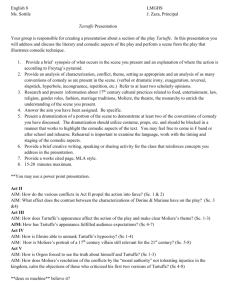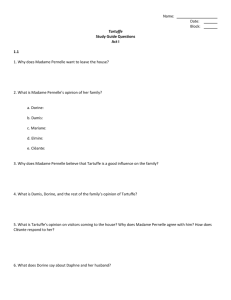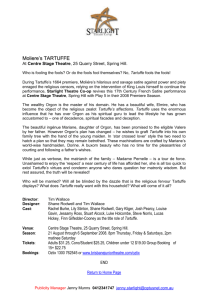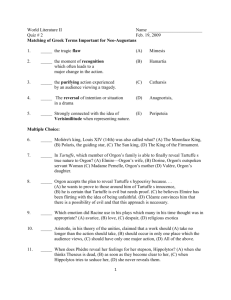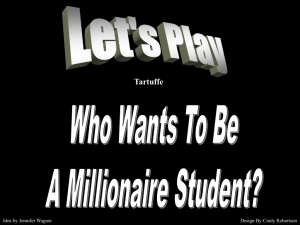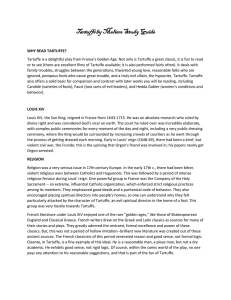ENL 204: Survey of Western Literature II, Master Syllabus
advertisement
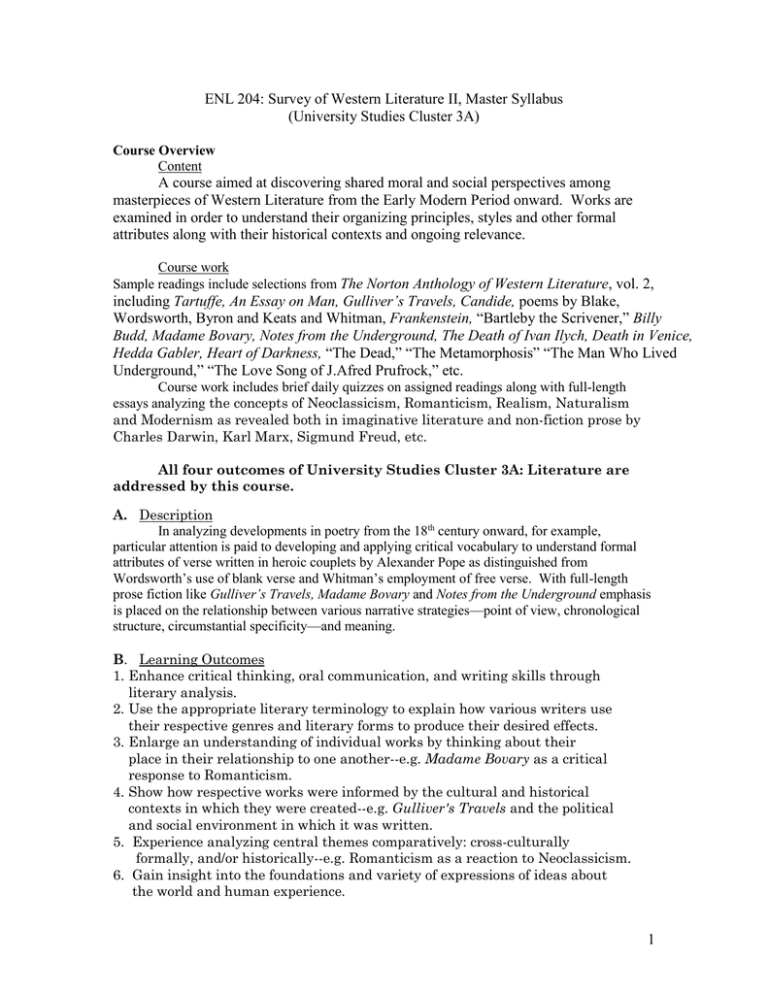
ENL 204: Survey of Western Literature II, Master Syllabus (University Studies Cluster 3A) Course Overview Content A course aimed at discovering shared moral and social perspectives among masterpieces of Western Literature from the Early Modern Period onward. Works are examined in order to understand their organizing principles, styles and other formal attributes along with their historical contexts and ongoing relevance. Course work Sample readings include selections from The Norton Anthology of Western Literature, vol. 2, including Tartuffe, An Essay on Man, Gulliver’s Travels, Candide, poems by Blake, Wordsworth, Byron and Keats and Whitman, Frankenstein, “Bartleby the Scrivener,” Billy Budd, Madame Bovary, Notes from the Underground, The Death of Ivan Ilych, Death in Venice, Hedda Gabler, Heart of Darkness, “The Dead,” “The Metamorphosis” “The Man Who Lived Underground,” “The Love Song of J.Afred Prufrock,” etc. Course work includes brief daily quizzes on assigned readings along with full-length essays analyzing the concepts of Neoclassicism, Romanticism, Realism, Naturalism and Modernism as revealed both in imaginative literature and non-fiction prose by Charles Darwin, Karl Marx, Sigmund Freud, etc. All four outcomes of University Studies Cluster 3A: Literature are addressed by this course. A. Description In analyzing developments in poetry from the 18th century onward, for example, particular attention is paid to developing and applying critical vocabulary to understand formal attributes of verse written in heroic couplets by Alexander Pope as distinguished from Wordsworth’s use of blank verse and Whitman’s employment of free verse. With full-length prose fiction like Gulliver’s Travels, Madame Bovary and Notes from the Underground emphasis is placed on the relationship between various narrative strategies—point of view, chronological structure, circumstantial specificity—and meaning. B. Learning Outcomes 1. Enhance critical thinking, oral communication, and writing skills through literary analysis. 2. Use the appropriate literary terminology to explain how various writers use their respective genres and literary forms to produce their desired effects. 3. Enlarge an understanding of individual works by thinking about their place in their relationship to one another--e.g. Madame Bovary as a critical response to Romanticism. 4. Show how respective works were informed by the cultural and historical contexts in which they were created--e.g. Gulliver's Travels and the political and social environment in which it was written. 5. Experience analyzing central themes comparatively: cross-culturally formally, and/or historically--e.g. Romanticism as a reaction to Neoclassicism. 6. Gain insight into the foundations and variety of expressions of ideas about the world and human experience. 1 Cluster 3A. Literature Student Learning Outcomes (SLO's)--Students will be able to: 1. Articulate how literature both reflects and helps shape culture, society and history. 2. Explain how a text's literary form, style and content express its meanings and using appropriate disciplinary terminology. 3. Evaluate the rhetorical and contextual elements of ideas presented by literary texts and respond to them critically and analytically. 4. Explain the ways in which literature expresses the values that humans attach to their experiences. C. Sample Text The Norton Anthology of Western Literature, vol. 2, ed. Sarah Lawal D. Example Single Assignment-From Artifact to Art (highlighting language related to University Studies SL#1, Articulate how literature both reflects and helps shape culture, society and history). Abbreviated description of assignment: Write a 1,500 word (6 word-processed page) essay in which you compare and contrast various attitudes toward ‘Reason’ expressed in Moliere’s Tartuffe, Swift’s Gulliver’s Travels, Pope’s Essay on Man, Rousseau’s Confessions and Wordsworth’s “Tintern Abbey.” All textual evidence must be accompanied by detailed analysis of the language in which the author’s or character’s view of Reason is expressed. E. Example Multiple-part Assignment--Group Performance (highlighting language related to University Studies SLOs @# 2,3, and 4) 1. Abbreviated description of assignment: Working in groups of 5-6 present to the class an interpretation of either Notes from the Underground or Heart of Darkness or "The Metamorphosis" or "The Man Who Lived Underground" as social criticism consistent with the views of Karl Marx or Sigmund Freud. This assignment counts 10% toward students' grades. 2. Related University Studies learning outcomes The group presentation project concerns Outcomes # 2,3, and 4 (See "Artifacts" below for indication of how its components address these learning outcomes individually): 2. Explain how a text's literary form, style and content express its meaning using appropriate disciplinary terminology. 3. Evaluate the rhetorical and contextual elements of ideas presented by literary texts and respond to them critically and analytically. 4. Explain the ways in which literature expresses the values that humans attach to their experiences. 3. Artifact generated by the assignment that can be sued to measure student learning: Essays: 20% each: 2 Write a unified 6-page (1,500-word) typewritten essay on Flaubert’s use of irony in Madame Bovary. Be sure to include a controlling thesis and concrete supporting evidence drawn from the text. Direct quotations should mainly be limited to illustrations of style, but regardless do not count toward the word and page requirements. Evaluative criteria: Essays significantly shorter or longer than 1,500 words (6 typewritten pages) or padded with unanalyzed quotations will be penalized proportionately. Ignoring instructions outlined on the format sheet entitled, "Manuscript Format" will result in a full letter-grade penalty. Remember to include a title that encapsulates your thesis. A full letter-grade will be deducted for recurring errors in grammar, punctuation, spelling, etc., or generally careless appearance. Unless your essay has a thesis and concrete supporting evidence the highest grade it will receive is C-. Simply re-telling the "plot," stringing together various quotations, or listing various "objects of ridicule" will likewise earn no higher than a C-. You may use class notes and 'outside sources'—so long as you document the latter. Organize your essay in any fashion you wish, but make sure it does have some recognizable principle of organization. F. Examinations (20% each): Exam Advisory Armed with the following information, a reasonably conscientious student should do reasonably well on the First Hour Exam if (1) she or he reviews these materials carefully; and (2) he or she studies intelligently, practicing responses to hypothetical excerpts by writing out sample essays. Reviewing for 4-5 concentrated hours should be sufficient if you have kept up with the reading. INSTRUCTIONS: This exam is in 3 parts: 10 minutes, 25 minutes and 25 minutes--so budget your time accordingly, skipping over excerpts you can't immediately identify. PART I(10 points): Identify the following 10 excerpts by title and author. Advice: With only 10 minutes for this part, you must either know the works/authors immediately or skip past those you don't know. Excerpts are neither embarrassingly obvious nor unfairly obscure. PART II (60 points): Discuss the significance (i.e., meaning and importance) of 3 correctly identified excerpts supplied on the exam, in relation to the larger works from which they come. The more concrete references you make both to the given excerpt and its larger context, the more credit you are likely to receive. Advice: Sometimes what depresses both the exam results and the individuals who produced them is simply ignoring directions—especially by discussing more than one passage by the same author. Thus, if you mistakenly discuss 2 Chaucerian excerpts you will automatically forfeit 20 points. 3 Beyond that, the problem is usually either not preparing well enough or else ignoring the basic requirement to discuss the SIGNIFICANCE of a given passage in relation both to its immediate context and relevant features elsewhere in the work. This entails far more than just summarizing the specific passage, much less simply ‘retelling the story.’ It means finding thematic, structural and stylistic 'connections' between the given excerpt and other parts of the larger work. For the Canterbury Tales, start by making those connections to the specific tale or prologue before moving outward to the framework narrative as a whole. Responses should be in the range of 150-250 words each, writing fluency is a definite asset--but no substitute for thoughtfulness PART III (30 points): Write a reasonably well-organized essay on 1 of the following 3 topics comparing and contrasting a film we have discussed with a written work we have discussed. I will supply the specific topics in advance. For maximum credit, be sure to have a THESIS and concrete SUPPORTING EVIDENCE from the works--the more, the better (within reason). Advice: Make an outline ahead of time, focusing on two works you understood best, and then decide which of the possible approaches best suits the materials you have selected. If you care to run some ideas by me either in person or via e-mail, by all means feel free to do so. Just remember: neither work used in this part of the exam may also be discussed under Part II. PART III (30 points): Write a reasonably well-organized essay on 1 of the following 3 topics, incorporating into your discussion at least1 work not discussed under PART II. For maximum credit, you must have a THESIS and concrete SUPPORTING EVIDENCE from the works—the more, the better (within reason). 1) Moliere’s attitude toward “Reason” in Tartuffe. 2) Compare and contrast Man’s relation to Nature in “Tintern Abbey” and Rousseau’s Confessions. 3) “Romantic” elements in Wordworth’s “Tintern Abbey,” Shelley’s “Stanzas Written in Dejection” and Keats’s “Eve of St. Agnes.” Sample Responses to Part III: #1) This passage was spoken by Cleante (Orgon's brother-in-law) to Orgon after Orgon discovered that Tartuffe has betrayed and conned him. Upon this realization, Orgon denounced Tartuffe's religious piety and stated that from now on he would never trust anybody who is pious or religious. Cleante, the voice of reason and moderation throughout the play (probably the voice of Moliere), is continually trying to persuade Orgon to become more calm, rational, and reasonable. Orgon, a fool, seems to know nothing but one extreme or another. In this case, Orgon, after becoming a pious and religious fanatic through the influence of Tartuffe, is now ready to partake in a complete reversal and be totally against religious piety. Moliere stresses this reason and moderation in this serious comedy. The play denounces religious hypocrisy (although none of the characters are actual religious hypocrites--Tartuffe is a con-man merely using piety as his tool; Orgon seemingly wants 4 religion in his life, but is a fool, and uses it to compensate for his failing powers). Cleante (Moliere) is constantly showing the reader/viewer the dangers of extremism. This passage illustrates that by taking the middle course and using moderation and reason, one is less apt to make mistakes in life. By taking such advice, one probably wouldn't ever be in the position foolish Orgon found himself in. Assessment:[27 points, A-] Quite solid. Perhaps might have considered how the contrived ending fits into this scheme: King as embodiment of `moderation.' Also, one or two concrete examples of Orgon's extremism would help. Otherwise, very competent. #2) This passage is of great importance in that not only is it significant to Tartuffe, but it holds great meaning for today's society as well. At the point of the play that the Father utters these words, I can almost hear the gasp from the audience. To think that a person could be so enticed by a religious hypocrite as to proclaim indifference at the death of his family is shocking. The quote also reinforces the somewhat dark feeling in Tartuffe; the ominous, invisible presence and feeling of doom that such a statement evokes. In fact, at the end of the play we see tragedy on the verge of winning as the entire family is almost dispossessed and thrown into the street by the common Tartuffe. Only an act of God (or the King) is able to save them and "sort of" convince us that life is good. The heart of satiric criticism in the quote, however, is directed at those religious zealots who value religiosity more than what religion is supposed to stand for. To Moliere, a hypocrite is taken up with piety, outward appearance, and "going through the motions" to impress others, and has forgotten the point of true religion is supposed to be kindness, forgiveness, and love. Unfortunately, this is a lesson that can be well learned today as much as it could in the time of Moliere. Assessment:[24 points: solid B answer] Excellent on general significance, but needs more concrete examples of actual implementation of Orgon's disregard for his family and lack of self-knowledge. 1. "Eve of St. Agnes" - John Keats Porphyro, a main character in this poem, acts upon a passion for his true love, Madeline. Regardless of his unfortunate lower rank, and despite the disapproval from her family, Madeline chose to follow her passion/love for Porphyro...against all odds. The Romantic time this was written empowers the passion of love... Keats choose, through these two lovers, to show that this passion (and disregard for reason--for it made no sense to go for Porphyro, who had no money, no name, and no way to take care of her) comes at a high price. In this excerpt, Porphyro, in diction strongly celebrating the exotic, watches Madeline dream about her lover (Porphyro). Meanwhile, however, the wind that whips at "the window-panes," with "sharp sleet," "like love’s alarm" reminds him (and therefore the readers) of the cold, harsh world awaiting their escape. It is literally [actually "figuratively"] a warning that there will be repercussions to their happiness--the world is not necessarily a joyous place welcoming them. it does not exclude the passionate lovers from its harsh reality. Without each other, they would both be emotionally miserable, but she would be better off socially and financially. m with each 5 other they are happy, but socially degraded and financially deprived. Keats points out that man uses passion over reason because it is personal; this is at the cost of social, impersonal, and financial advantages she once had. COMMENT: Very good on thematic implications but needs more on the dream itself. 18/20 6
